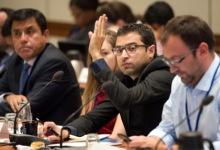
Typical street scene in Santa Ana, El Salvador. (Photo: iStock)
IMF Survey : IMF Invites Civil Society Input on Its Surveillance Role
February 24, 2014
- IMF to review how it assesses the economies of its member countries
- Review will look at effectiveness and evenhandedness of IMF surveillance
- Civil society welcome to provide input via online consultation
The IMF is seeking the views of civil society organizations (CSOs) on how to improve the effectiveness and traction of its surveillance—its role overseeing the international monetary system and monitoring the economic and financial policies of its 188 member countries.

Members of civil society organizations at IMF-World Bank Annual Meetings. The IMF regularly seeks feedback from outside groups on policy initiatives (photo: IMF)
IMF’S PUBLIC OUTREACH
The consultation with CSOs will form part of the 2014 Triennial Surveillance Review, a periodic evaluation of how well the IMF assesses the risks and prospects for economies around the world.
To ensure broad input from civil society, an online consultation on the 2014 review will be open until April 30, 2014.
Strengthening IMF surveillance
The IMF reviews the effectiveness of its economic analysis and policy advice—known as surveillance—every three years, and makes recommendations for improvement. The latest triennial surveillance review was completed by the IMF’s Executive Board in October 2011.
The 2011 review found that although the IMF’s advice was seen as timely and responsive during the global financial crisis, surveillance before the crisis suffered from a number of weaknesses. In particular, the IMF needed to do more to promote analysis of interconnectedness, risks, financial stability, external stability, and traction of surveillance. In response, the IMF’s Managing Director proposed an action plan to make surveillance more effective, candid, and evenhanded.
Since 2011, the IMF has taken a number of steps to improve surveillance. These include:
• a reform of the IMF’s legal framework so the institution can better examine outward spillovers from one region or sector onto the global economy;
• the deepening of risk assessments in country staff reports, supported by the introduction of “risk assessment matrices”;
• the development of a financial surveillance strategy to improve risk identification and policy analysis, to foster greater integration of instruments and products, and to engage more actively with stakeholders; and
• the publication of Pilot External Sector Reports that provide a multilaterally consistent analysis of the external positions of major world economies.
Goals for the 2014 review
Under the overarching objective of strengthening the effectiveness and traction of IMF surveillance, the 2014 exercise will take stock of the extent to which the new initiatives introduced since 2011 are serving the institution’s commitments to its membership. Specifically, the review will consider how effectively the IMF is implementing the new surveillance framework and how it can respond to new policy challenges. The evaluation will also examine the evenhandedness of IMF surveillance and consider possible recommendations to strengthen this aspect of it.
As with the last review, the 2014 exercise will base its findings and recommendations on a wide range of research and feedback, including from CSOs. These include in-depth staff studies, evaluation of country reports, stakeholder surveys and consultations, interviews, and studies by external consultants. The review’s findings and recommendations will also be assessed by an independent External Advisory Group.


